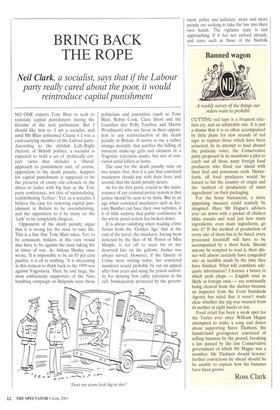BRING BACK THE ROPE
Neil Clark, a socialist, says that if the Labour
party really cared about the poor, it would reintroduce capital punishment
NO ONE expects Tony Blair to seek to reinstate capital punishment during the lifetime of the next parliament. But I should like him to. I am a socialist, and until Mr Blair jettisoned Clause 4 I was a card-carrying member of the Labour party. According to the childish Left–Right rhetoric of British politics, a socialist is expected to hold a set of 'politically correct' views that includes a 'liberal' approach to punishment and, of course, opposition to the death penalty. Support for capital punishment is supposed to be the preserve of crusty old colonels in the shires or ladies with big hats at the Tory party conference, not that of nationalising, redistributing 'Lefties'. Yet, as a socialist, I believe the case for restoring capital punishment in Britain to be overwhelming, and the opposition to it by many on the 'Leff to be completely illogical.
Opponents of the death penalty argue that it is wrong for the state to take life. This is a line that Tony Blair takes. Yet, to be consistent, holders of this view would also have to be against the state taking life in times of war. As Aldous Huxley once wrote, 'It is impossible to be an 85 per cent pacifist, it is all or nothing.' It is interesting in this context to think back to the 1999 war against Yugoslavia. Then, by and large, the most enthusiastic supporters of the Nato bombing campaign on Belgrade were those
politicians and journalists (such as Tony Blair, Robin Cook, Clare Short and the Guardian duo Polly Toynbee and Martin Woollacott) who are fierce in their opposition to any reintroduction of the death penalty in Britain. It seems to me a rather strange morality that justifies the killing of innocent make-up girls and cleaners in a Yugoslav television studio, but not of convicted serial killers at home.
The case for the death penalty rests on two tenets: first, that it is just that convicted murderers should pay with their lives; and second, that the death penalty deters.
As for the first point, crucial to the maintenance of any criminal-justice system is that justice should be seen to be done. But in an age when convicted murderers such as Jeremy Bamber can have their own websites, it is of little surprise that public confidence in the whole penal system has broken down.
It is always satisfying when reading crime fiction from the 'Golden Age' that at the end of the novel, the murderer, having been detected by the likes of M. Poirot or Miss Marple, is led off to meet his or her deserved fate on the gallows. Justice was always served. However, if the Queen of Crime were writing today, her convicted murderer would probably be out on appeal after four years and suing the prison authority for denying him cable television in his cell. Inadequately protected by the govern ment, police and judiciary, more and more people are seeking to take the law into their own hands. The vigilante state is fast approaching, if it has not arrived already, and cases such as those of the Norfolk farmer Tony Martin will become more and more common.
The second point, that capital punishment acts as a deterrent, has always been disputed by the anti brigade. Yet every country that has abolished the death penalty has, within five years, seen a dramatic increase in its murder rate. The most notable recent example of this phenomenon is South Africa, with Johannesburg being transformed into one of the most dangerous cities in the world. The main reason for this is simple. In the days of the death penalty, criminal gangs would take great care to avoid the risk of violence in their activities, because they knew that. if a killing ensued, they might pay with their lives. Moreover, there is one crime for which the death penalty is arguably the only deterrent, namely the smuggling of hard drugs. With the potential rewards running into millions, and the chances of being caught and punished slim, it is no wonder that, despite 'Drug Czars' and numerous other costly government initiatives, Britain is, in the words of the National Crime Intelligence Service, 'awash with drugs'.
Compare the position of Britain with that of Singapore, a country at which Western liberals love to sneer. All those arriving at Singapore airport are greeted by a large sign stating that anyone convicted of carrying more than a small amount of controlled drugs faces the mandatory death sentence. The message could not be plainer. The result is that Singapore is one of the most drug-free nations on earth, and consequently one of the safest. It may be boring for some, but those who get their kicks from watching armed robberies can always go elsewhere.
Even if we agree that the death penalty acts as a deterrent, what about the possible miscarriages of justice which the antihanging liberals love to keep reminding us of? Inevitably, miscarriages of justice did occur when Britain had the death penalty, but their number was tiny and must be set against the considerably larger number of people saved from violent death by the much lower homicide rate. Now, though, there is the very real breakthrough of DNA-testing, which narrows the odds of wrong conviction to one million to one, That still may not be good enough for Paul Foot and Ludovic Kennedy, but it is for me and, I expect, for most other people. The great tragedy about the abolition of the death penalty is that it never was the result of public opinion. In fact, every opinion poll ever taken has shown a clear majority in favour of capital punishment.
To understand why it was abolished, one has to look at changes that took place within the Labour party 50 years ago. From its inception in 1900, the party was primarily working-class. Most of its leaders and key policy-makers were drawn from the working class, and as a result their social values were often more conservative than those of the Tories. The Labour governments of 1924, 1929-31 and 1945-51 all supported the retention of capital punishment. However, from the 1950s things began to change.
A group of middle-class, mainly Oxbridge-educated intellectuals began to gain more and more power within the party. Members of this group, such as Roy Jenkins and Tony Crosland, were liberals rather than socialists, and their main aim was the social, rather than the economic, transformation of Britain, Out with the death penalty and other such Victorian nonsense, and in with penal reform, easy divorce and the freedom to say 'fuck' on television. Although their views had little support among the British working class, this group of 'reformers' managed to take control of the Labour party's social policy and to push through their agenda, starting with the abolition of the death penalty in 1965.
Thirty-five years on, the damaging result of abolition is all too plain to see. Britain has been transformed all right, as Roy Jenkins and his entourage so desperately wanted, but into a violent and dangerous country. In the year the death penalty was abolished there were 57 murder convictions in Britain; in 1999 there were 241. Britain now has the highest murder rate in Europe. It is time for the people of Britain — the great majority of whom never wanted the death penalty abolished in the first place — to call time on this disastrous liberal penal experiment.
It is also time for the Labour party to acknowledge the mistakes of the past and to ditch its illogical opposition to capital punishment. As Theodore Dalrymple pointed out recently in this magazine, it is the poor — Labour's natural constituency — whose lives are most severely blighted by violent crime and who have lost most from the reforms of the 1960s. Tony Blair claims to have made New Labour a listening party. He also claims to be 'tough on crime'. Only by bringing back the ultimate deterrent can we start to take these claims seriously, and at the same time to make our ever deadlier streets safe once again.
Neil Clark is a teacher and freelance journalist living in Oxford.



































































 Previous page
Previous page